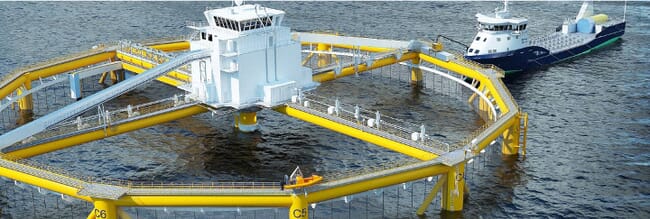A new scientific paper written for the High Level Panel a Sustainable Ocean Economy finds that, with better management and technological innovation, the ocean could provide over six times more food than it does today - more than two thirds of the animal protein that will be needed to feed the future global population, according to estimates from the FAO. The paper was published today at the FAO International Symposium on Fisheries Sustainability in Rome.

Christopher Costello, lead author of the paper and High Level Panel Expert Group4 representative, said: “The ocean has great, untapped potential to help feed the world in the coming decades, and this resource can be realised with a lower environmental footprint than many other food sources. Yet ocean health and ocean wealth go hand-in-hand. If we make rapid and far-reaching changes in the way we manage ocean-based industries while nurturing the health of its ecosystems, we can bolster our long-term food security and the livelihoods of millions of people.”
"The Future of Food from the Sea", authored by an esteemed group of scientists in support of the High Level Panel - a group of 14 heads of government - examines the current status and future potential of food production from the ocean. It finds that the ocean is uniquely positioned to contribute to food security due to the highly nutritious nature of seafood, which contains essential vitamins, minerals, long chain omega-3 fatty acids, and other nutrients not found in plant-based or terrestrial animal proteins. With reform, capture fisheries could produce as much as 20 percent more catch compared to today and up to 40 percent more than projected future catch, under current fishing pressures. Yet the largest potential gains for food production lie in the sustainable expansion of marine aquaculture (mariculture).
Accelerating the production of mariculture species, such as seaweed and mussels, that do not rely on direct feed inputs could contribute to global food supply while improving water quality, creating habitat for wild fisheries, and contributing to coastal resilience. Mariculture species that are fed on fishmeal and fish oil derived from capture fisheries, such as fish and crustaceans, can also significantly contribute to future protein supply, yet only if alternative feeds are fast tracked by the sector, and environmental effects can be minimised.
Manuel Barange, Director of FAO Fisheries and Aquaculture Policy and Resources Division and High Level Panel Advisory Network participant, said: “To fulfill our aspirations of creating a more equitable, prosperous and food secure world, the global community must work together to end over-fishing, improve global fisheries management and prioritise low-impact mariculture approaches. This would bolster food security and help eradicate hunger, the lynchpin for achieving the UN Sustainable Development Goals.”
The paper identifies the main barriers to increasing food production from the ocean, including key environmental, economic and regulatory issues, and proposes a realistic set of actions to overcome them. It also provides a framework that leaders and scientists can use to inform policy decision-making and implementation, according to their regional or local contexts. Importantly, the paper highlights that producing more food from the sea will depend not only on actions and reform within the fisheries and aquaculture sector, but also global action to address climate change, habitat degradation and pollution and improve ocean governance.
President Kenyatta of Kenya, a member of the High Level Panel, said: “Food from the ocean is of great economic and social value to Kenya and the rest of Africa. Millions of us in Kenya and across Africa depend on the ocean for income, jobs, food, protein and other nutrients. Yet harnessing the potential of our ocean to provide food for the future cannot be achieved by any one country alone. It requires a unified global vision, centred around sustainability, multilateral actions and significant investments to support nations in their efforts to secure jobs, food and nutrition for billions of people.”


